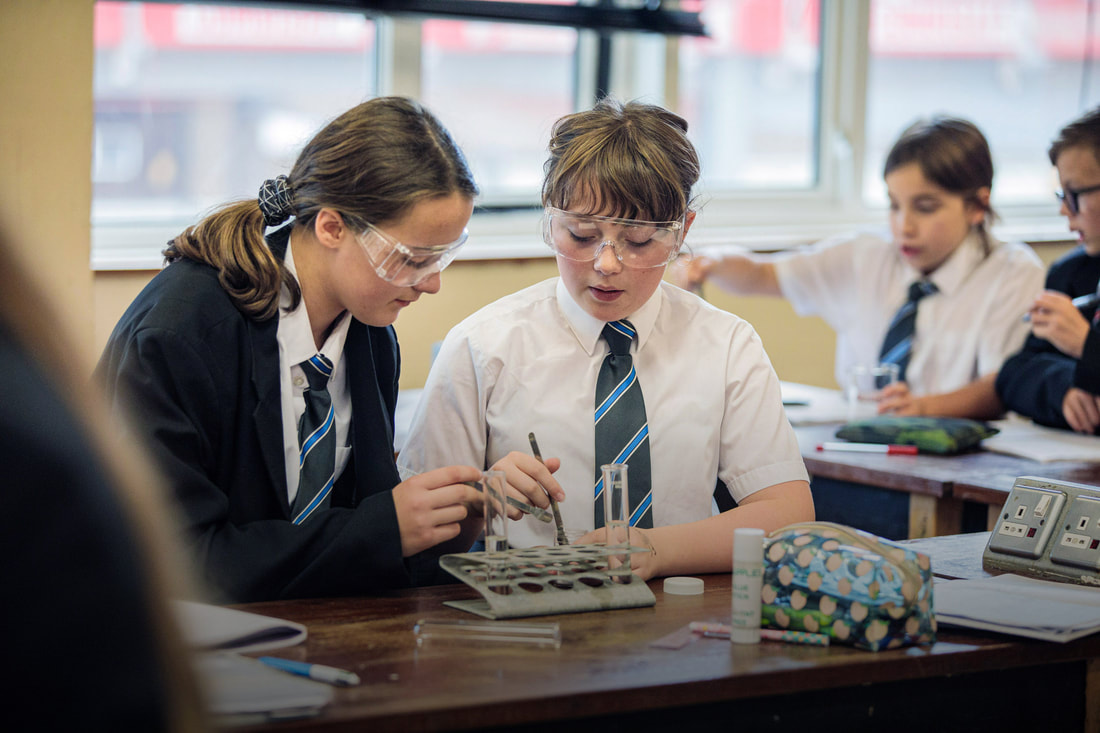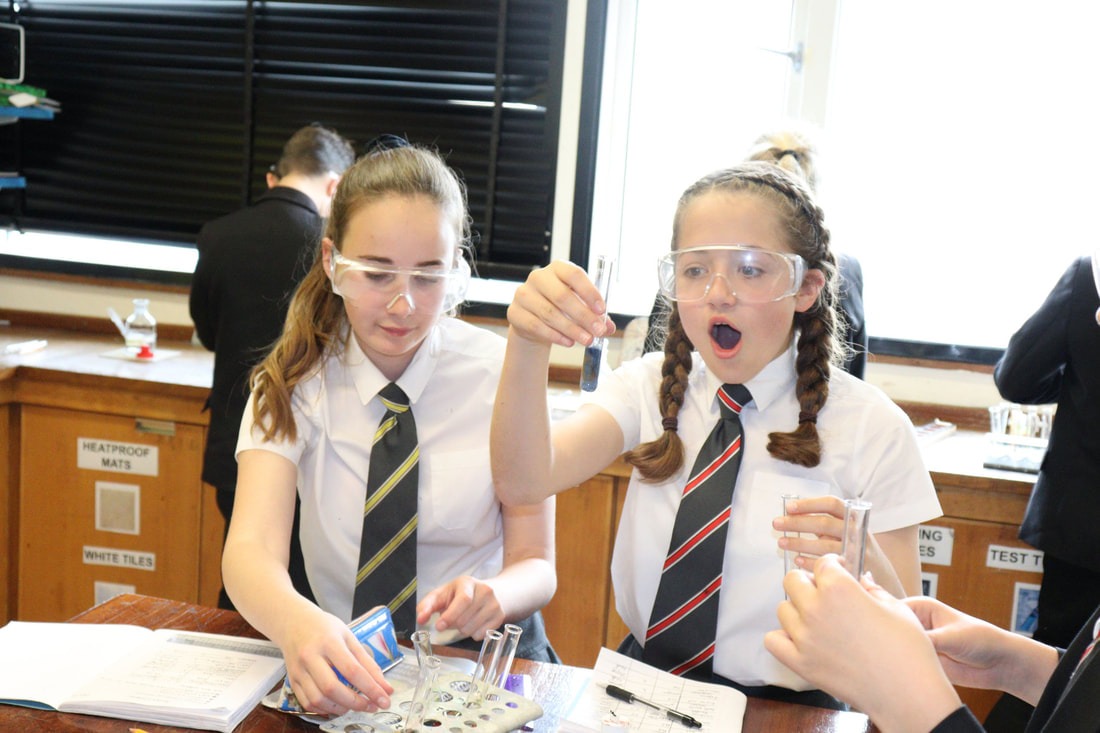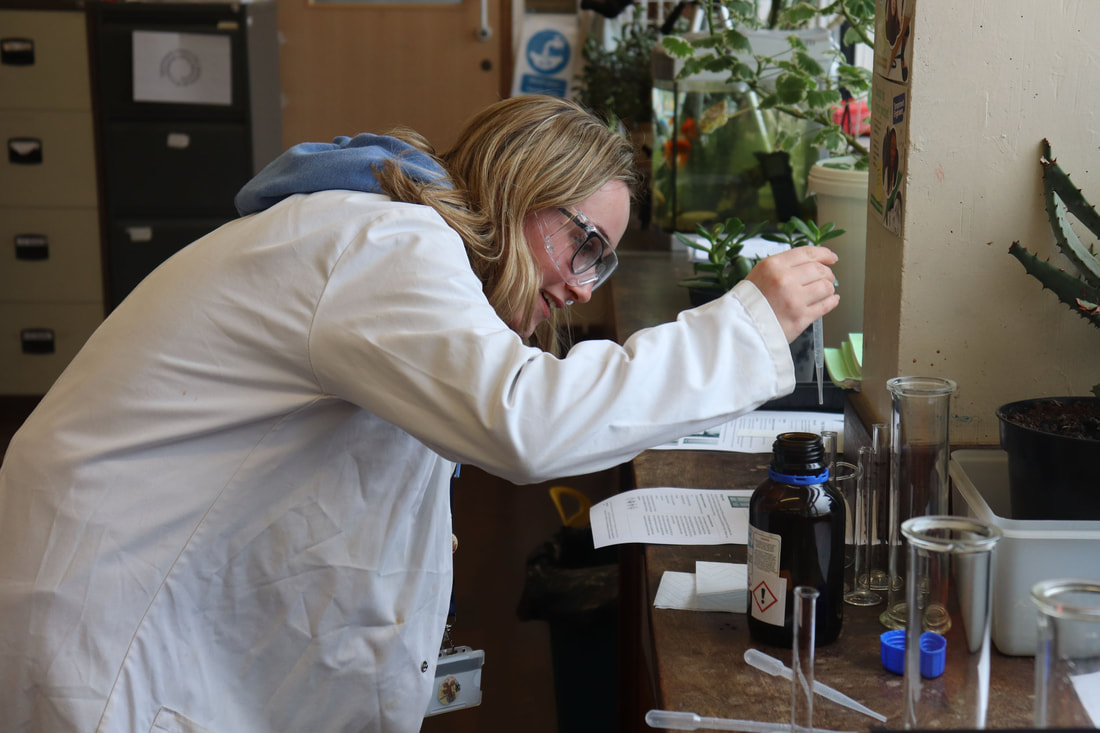Science Department IntentOur science curriculum will develop curiosity and nurture interest in our shared environment enabling our students to become kind, informed and responsible global citizens. It will develop students who are able to make informed decisions for themselves as individuals and within society as a whole.Students will learn about the uses and significance of science to society and their own lives. And have an education which enables them to access diverse and valuable careers. Key stage 3
What do students study?
All students follow KS3 programme based on the National Curriculum. Lessons contain a strong practical element and are all taught by specialist Science staff. Students study a wide range of topics including covering content from Biology, Chemistry and Physics. Students are taught in mixed ability grouping with one top set introduced in year 9. Enrichment and trips vary throughout the year, including activities like visiting Paignton Zoo, talks and shows by various speakers, and house competitions. We celebrate Sidmouth Science Festival in October and British Science Week in March, with activities planned in and out of lessons. In year 9, students transition from KS3 to KS4 and begin studying their GCSE course shortly after December. How are students assessed? Students' progress is measured in a variety of ways throughout the year, including observations of practical skills, multiple choice quizzes, and written tests. Every group will sit an end of year assessment Key stage 4
Combined and Separate ScienceWHO IS THIS COURSE FOR?
All students are required to complete a minimum of two GCSEs in Science. In Science we run two programmes of study - AQA Combined (Trilogy) Science and AQA Separate Science. All students will study Biology, Chemistry and Physics, with Separate Science students covering a wider range of content. Students completing the Combined Science course will be awarded two GCSE grades, reflective of their performance in all three sciences. Those taking Separate Science will be awarded a grade for each subject. All students are welcome to apply to study Separate Science in year 9, and selection for the course is based on teacher assessment throughout KS3, attitude to learning, and attainment in assessments. Taking three science GCSEs is rewarding, but academically demanding and students should have a passion for Science. Strong literacy and numeracy skills are essential. EXAM BOARD, COURSE CONTENT & ASSESSMENT DETAILS AQA GCSE Combined (Trilogy) Science AQA GCSE Biology, Chemistry, Physics All content and course information can be found on the AQA website. All exams will constitute 100% of the final GCSE grades. In order to accommodate the greater volume of content, Separate Science exams are longer: Combined: 1 hour 15 minutes Separate Science: 1 hour 45 minutes. Combined Science and Separate Science will sit exams in the same format: Biology: 2 exams Chemistry: 2 exams Physics: 2 exams WHAT CAN THIS COURSE LEAD TO POST 16? Both Combined and Separate Science GCSEs allow students to progress onto A level and level 3 BTEC studies. Sidmouth College (and most other FE course providers) requires a minimum of two Grade 6s to be accepted onto science courses. Although not compulsory, a Grade 6 in Mathematics is preferred. FOR WHAT CAREERS WILL THIS COURSE BE USEFUL? There is a vast number of science based careers for students to follow, for which this course will be suitable including, but not limited to, medicine, nursing and midwifery, veterinary surgery and science, clinical research, laboratory research, engineering, robotics, genetic engineering, sports science and environmental management. Science also provides a wide range of transferrable skills required by employers, including the public and armed services. OTHER RELEVANT INFORMATION We provide opportunities to buy discounted revision guides that go alongside this course. Combined ScienceWHO IS THIS COURSE FOR? Combined Science provides the foundations for understanding the material world. Scientific understanding is changing our lives and is vital to the world’s future development, and all students will be taught essential aspects of knowledge, processes and uses of science. Students will study a combination of Biology, Chemistry and Physics, and results in two linked Science GCSE grades*. Those students not studying Triple Science will study Combined Science as part of the College’s core curriculum. EXAM BOARD, COURSE CONTENT & ASSESSMENT DETAILS In line with the changes made by Government to GCSE Science, Combined Science is a new GCSE course from the AQA exam board. Exams and assessment: Students will sit 6 exams in the summer of Year 11, comprising 2 exams each for Biology, Chemistry and Physics. These exams will constitute 100% of the final GCSE grades. WHAT CAN THIS COURSE LEAD TO POST 16? The Combined Science GCSE is designed to give students access to all three Science A levels and other courses in further education, but students will need to achieve a minimum grade to be accepted onto these courses. This course will also enable students to go on to Level 3 Science BTEC courses. FOR WHAT CAREERS WILL THIS COURSE BE USEFUL There is a vast number of science based careers for students to follow, for which this course will be suitable including, but not limited to, veterinary science, nursing, medicine clinical research, laboratory research, engineering, computing, environmental management and work in public and armed services. Science also provides a wide range of transferrable skills required by employers. OTHER RELEVANT INFORMATION We provide opportunities to buy revision guides that go alongside this course. *Under the new GCSE grading system, Combined Science students will be awarded two paired grades 9-9, 9-8 through to 2-1 and 1-1 Key stage 5
BiologyIntroduction
Biology is the study of living things, from cells to ecosystems. If you are fascinated by the huge variety of life on Earth, and wish to gain an insight into how organisms work and interact, then Biology could be for you. What do students study? At Sidmouth College we follow the new AQA level qualification. A level Biology lasts two years with all examinations taking place at the end of two years. Practical investigations are an essential part of the course. Core Content
Assessment is carried out through examinations only. Students will study modules over the two years, leading to an A Level qualification in this subject. ChemistryIntroduction
Chemistry is all around us; from our sinks to our medicine cabinets, from our cosmetics to the colour of our clothing, and from our fuels, metals, plastics and polymers to the silicon, vital to the computer hardware that we use every day. What do students study? At Sidmouth College, we follow the new AQA A Level Chemistry course. Many chemical molecules and materials are studied in depth at A Level because of their importance in our increasingly diverse and technological world. The core content that you will study is listed below. Core Content
Assessment is carried out through examinations only. Students will study modules over the two years, leading to an A Level qualification in this subject. PhysicsIntroduction Physicists explore the fundamental nature of almost everything we know. They probe the furthest reaches of the Earth to study the smallest pieces of matter. Join them to enter a world deep beneath the surface of normal human experience. What do students study? Throughout Physics A Level you will study a variety of topics including:
How are students assessed? At Sidmouth College we are following the AQA A Level Physics over two years. Practical investigations are an essential part of the course. Comments are closed.
|
Access Octomono Masonry Settings
Subjects
All
|
- Home
-
About Us
- About our School
- Board of Governors
- Careers & Education Guidance
- Contact
- Equality
- Ethos and Values
- Exam Results >
- Hire of School Premises
- Links & Partnerships
- Ofsted Reports
- Our People
- Performance Data
- Policies
- Principal's Welcome
- Pupil Premium
- SEF & College Priorities
- Sidmouth College Way
- Ted Wragg Trust
- Vacancies
- Visitor Information
- Wellbeing at School
- Admissions
- Learning
-
Parents
-
Students
- Sixth Form
Useful links |
Navigate |
|
© Sidmouth College 2020 | Primley Road, Sidmouth, Devon EX10 9LG | Website design by Bright Blue C











